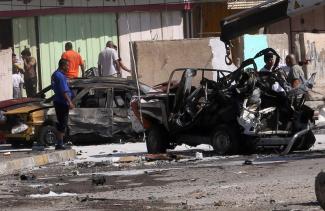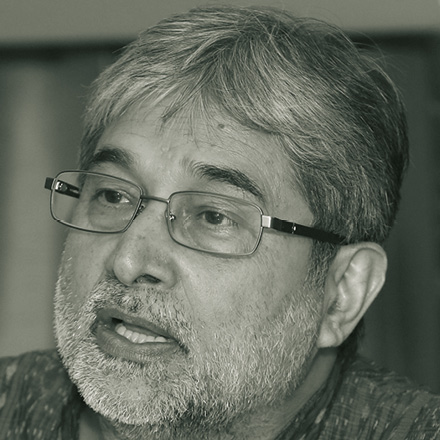OECD guidelines
Forgotten principles
 Khalid Mohammed/AP Photo/picture-alliance
Khalid Mohammed/AP Photo/picture-alliance
Approximately one third of all official development assistance (ODA) worldwide goes to fragile states. The Organisation for Economic Co-operation and Development (OECD), a club of rich nations, considers countries "fragile" if they lack the political will or the capacity to reduce poverty, promote development and protect human rights. Fragile states often do not have the basic infrastructure or administrative institutions to fully enforce their monopoly on the use of force. The results are high levels of crime, vigilantism and despotism by whichever players happen to be the strongest.
Such problems make it difficult for development agencies to provide aid where it is needed most. Aid workers frequently operate in very dangerous, even life-threatening conditions. Violence or coups may occur at any time. Development cooperation is meant to help build government institutions and initiate fundamental reforms. However, agency leaders cannot always meet their own standards, for instance by relying on contractors in the target country. If they cannot find suitable companies or experts in the country, they must rely on partners from neighbouring countries or even donor countries. All too often, the result is parallel structures, which ought to be avoided.
Many scholars and development experts argue that agency efforts in fragile states tend to be patronising or ineffective. Agencies often do not sufficiently understand the local context and do more harm than good.
In many cases, moreover, it is difficult to reconcile objectives of security, politics and development. International peacekeepers are stationed in many fragile states. The paramount goal of these troops and their commanders is to maintain security. Their interests are not always directly tied to development.
In order to address these problems, the OECD Development Assistance Committee (DAC) approved ten "Principles for Good International Engagement in Fragile States", or "Fragile State Principles" (FSPs) for short (see box). These principles were drafted in 2007 in cooperation with representatives from affected countries.
The OECD recognises that fragile states require development programmes that are tailored to their specific needs. The goal is to maximise the positive effects of international engagement and minimise possible harm. Doing both requires a precise analysis of what is needed in each situation. International actors must conduct risk analyses before entering a country and learn from negative experiences.
A lack of implementation
Of course, the Fragile State Principles cannot solve all development-policy problems in fragile states, but even minor successes are difficult to identify so far. A 2011 study by the OECD found out that donor countries pay little attention to the Principles. The study concluded that eight of the ten Principles are basically being ignored.
The OECD considers performance on Princpile 6 (Non-discrimination and gender equality) to be broadly on track, and it sees progress in regard to Principle 7 (Cooperation with local institutions). The other principles are not being observed at all or not adeqately. Unfortunately, the OECD did not publish separate assessments for individual donor governments.
The OECD designed the FSPs to match other internationally agreed principles, such as the United Nations' Millennium Development Goals (MDGs) and the Paris Declaration on Aid Effectiveness. Different guidelines can compete with each other in practice, however, although the OECD incorporated the Fragile State Principles into the larger context of international agreements.
The MDGs, for instance, emphasise fighting poverty. They do not address issues of fragile statehood and good governance. In the study cited above, the OECD pointed out that the MDGs are not a good tool to solve the central problems of fragile states. Sustainable achievement of the MDGs will require more than reducing poverty in these countries. Nevertheless, the MDGs are much better known than the Fragile State Principles, and governments are more likely to strive to fulfil them.
The Fragile State Principles are directly related to the international debate on aid effectiveness, which was started by the OECD in the past decade (see focus in D+C/E+Z 2012/02). The probably most prominent result was the Paris Declaration on Aid Effectiveness, which was endorsed by the international community in 2005. The Paris Declaration has since become an important reference point. Its five core principles are:
- ownership (developing countries must assume responsibility for their own development),
- alignment (ODA must rely on institutions and procedures of developing countries),
- harmonisation (donors must coordinate their action),
- managing for results and
- mutual accountability of donors and recipients.
There is no system for assessing donor compliance with the FSPs however, whereas progress on the MDGs monitored diligently. The implementation of the Paris principles has similarly been evaluated, and the data showed that developing countries have made more efforts in this regard than advanced nations.
In Germany, neither policymakers nor academics criticise the Fragile State Principles. On the contrary, Germany's Federal Ministry for Economic Cooperation and Development (BMZ) has explicitly based its policies on the Fragile State Principles, as demonstrated in publications from 2007, 2012 and 2013 (see links). Germany has also joined the OECD's International Network on Conflict and Fragility (INCAF). The Network was established in 2009; its mission is to gather expertise for the DAC, coordinate measures and promote dialogue between donors and partner countries.
The OECD last published a detailed evaluation of Germany’s performance in 2010 (http://www.oecd.org/berlin/46270433.pdf). The report appreciated the implementation of FSPs in national policies as well as German contributions to INCAF. However, the report also found out that there was a lack of coherence, and called for more interlinkages between sector policies (p. 35). To some extent, Germany’s Federal Government has responded to such criticism by publishing a cross-departmental strategy (BMZ/AA/BMVg 2012). The OECD, however, also points out that Germany invests too much ODA in middle-income countries which tend not to be fragile (p. 56).
The main reason the FSPs do not get much international attention is probably that they hardly figure beyond strategy papers. They are simply not on the agenda, neither an issue of praise nor of scorn.
In contrast to other agreements and guidelines, they are hardly mentioned in the mass media or in academic discourse. That means that there is little pressure on policy-makers to take heed.
The Fragile State Principles are simply drowned out by the large volume of other guidelines and agreements that are considered more important. It is also probably easier to address other development issues besides fragile statehood.
Nevertheless, progress has been made since the OECD conducted its study. The latest strategy paper from the BMZ offers hope that the shortcomings will be resolved. It would be beneficial to incorporate the principles from the BMZ strategy papers into the wider debate on fragile statehood.
Vera Dicke studies peace and conflict in Darmstadt and Frankfurt. She wrote her bachelor's thesis at the Darmstadt Technical University on the implementation of the Fragile State Principles.
mail@veradicke.de



